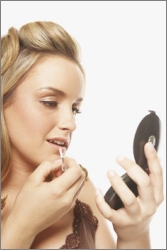The Health Risks of Typical Cosmetics &
Make-Ups and the Alternatives
by www.SixWise.com
The personal care products you use every day -- things like shampoo, conditioner, body lotion and makeup -- are not regulated by the U.S. Food and Drug Administration (FDA) or any other government agency.
|

It's perfectly legal for your cosmetics to contain cancer-causing chemicals.
|
What this means is that you could be washing your face or moisturizing your body with a product that contains harmful ingredients. It is actually perfectly legal for cosmetics companies to use ingredients known or suspected to be carcinogens, mutagens or reproductive toxins, according to the Environmental Working Group's (EWG) Campaign for Safe Cosmetics.
A survey by EWG found that more than a quarter of all women and one of every 100 men use at least 15 personal care products a day, which means exposure rates to these potentially toxic chemicals could be very high, particularly over time.
And though it may sound hard to believe, your personal care products are actually made up largely of industrial chemicals. One of every eight of the 82,000 chemicals registered for use in U.S. personal care products contain carcinogens, pesticides, reproductive toxins, endocrine disruptors, plasticizers, degreasers, and surfactants.
"They are the chemical industry in a bottle," writes EWG.
What Exactly is in Your Cosmetics?
Though the $50-billion U.S. cosmetics industry assures you that their products are safe, you should know that they are not required to test their product ingredients to determine if they have any negative, long-term health effects, such as cancer or reproductive damage.
In fact, even if a company claims to have tested its ingredients, it may have only been to check for rashes, swelling and other acute reactions. So you really must look out for yourself when it comes to buying cosmetics.
|

The cosmetics with the highest cause for concern, according to EWG's Skin Deep are:
- Hair color and bleach
- Hair relaxer
- Nail polish
- Skin lightener
- Nail treatment
|
Seven of the most toxic ingredients to always avoid, according to Skin Deep, include:
1. Mercury
This heavy metal is a possible human carcinogen and a human reproductive or developmental toxin. Used in some eye drops, ointments and mascaras (look for it listed as "thimerosal" on labels).
2. Placenta
Placenta produces hormones like progesterone and estrogen, which may interfere with your body's normal hormone functions and could lead to breast cancer and other health problems. Used in some hair relaxers, moisturizers and toners.
3. Lead Acetate
This has been prohibited from use in cosmetics in the European Union because it is known to cause reproductive and developmental damage. Used in some hair dyes and cleansers.
4. Petrochemicals
These byproducts of crude oil may be listed as petrolatum, mineral oil or paraffin on labels. They are suspected or known carcinogens and may also break down into toxic products such as dioxane. Used in some hair relaxers, shampoos, anti-aging creams, mascaras, perfumes, foundations, lipsticks and lip balms.
5. Phthalates
Phthalates are plasticizing chemicals that are probable reproductive or developmental toxins and endocrine disrupters. Two phthalates, dibutyl and diethylhexyl have been banned in the European Union. Used in some nail polishes, fragrances and hair sprays.
6. Hydroquinone
This ingredient is a possible carcinogen, a probable reproductive or developmental toxin and endocrine disrupter and may leave permanent black-blue lesions on your skin. Used in some skin lightening products and moisturizers.
|
Soothe Your Skin With Vermont Organics' Truly Natural Bath and Shower Gel!
Vermont Soap Organics' Castile Bath and Shower Gel is a blend of unique Aloe Castile liquid soap along with a special extract of vegetable gum in glycerin. This process adds extra emollients to create a shower gel that is a natural, organic, rich alternative to many of the artificial, synthesized commercial formulas on the market today.
- USDA Certified Organic
- Mild, Rich with Lots of Foamy Lather
- All Natural- leaves you squeaky clean and smelling great!!
- All natural ingredients
- Healthy, non-toxic alternative
- Detergent Free
- Contains no SLS or DEA
- Absolutely NO artificial colors, fragrances and preservatives
- Available in convenient 8oz or Economical, Money Saving Gallon Size!
Try it in Sweet Orange, Country Lavender, Peppermint Magic, Tea Tree, Grapefruit or Unscented!
Order Vermont Soap Organics' Bath and Shower Gel Now!
|
7. Nanoparticles
These very tiny particles are largely untested and unlabeled, and are able to be absorbed directly into your bloodstream. Used in some eye shadows, bronzers, sunscreens and lotions.
Choosing Safe Cosmetics
Only all-natural products will do, and this means inspecting the ingredient label of any product you purchase closely. Do NOT rely on the package's claims of "natural," "organic," or "hypoallergenic," as even these products can still contain dangerous ingredients. The term "hypoallergenic" can actually mean whatever a particular company wants it to mean, according to the FDA.
A general rule of thumb? The fewer ingredients listed, the better. Some generally safe and gentle ingredients are:
If you're looking for the crème de la crème in natural body care, you'll be delighted with Vermont Soap Organics' line of products. It was created to provide customers with high quality, natural personal care products -- nurturing for you and the environment.
Seeking an alternative to commercial formulas, Vermont Soap began working with saponified (soap based) foaming concentrates, creating their own natural Aloe Castile Liquid Soap formula.
Their Castile Bath and Shower Gel is a blend of the unique Aloe Castile liquid soap along with a special extract of vegetable gum in glycerin. This process adds extra emollients to create a shower gel that is a natural, organic, rich alternative to many of the artificial, synthesized commercial formulas on the market today.
This all-natural bath and shower gel is available in five deliciously soothing scents, which will leave your skin feeling soft, moisturized, clean and refreshed -- without a trace of chemical residues.
As for make-up and other cosmetics, we highly recommend checking with EWG's Skin Deep Cosmetic Safety Database to find out if the products you're currently using are hazardous. You can also search the site to find low-hazard cosmetics that are safe for you and your family.
Recommended Reading
11 Toxic Ingredients to Beware of In Typical Skin Moisturizers & The Safe Alternative
Warning: Phthalates in Cosmetics, Toys & More Can Pose Health Dangers
Sources
The Campaign for Safe Cosmetics: Unmasked: 10 Ugly Truths Behind the Myth of Cosmetic Safety
Skin Deep Cosmetic Safety Database